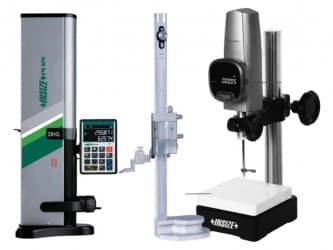Calipers
Calipers are measuring tools used to accurately measure distances between two points. They consist of two hinged legs or jaws that can be adjusted to fit the object being measured. Calipers are widely used in various industries and applications, including machining, engineering, metalworking, woodworking, and more. Here are the common types of calipers:
1. Vernier Calipers: Vernier calipers are traditional mechanical calipers with a main scale and a sliding vernier scale. The main scale provides the primary measurement, while the vernier scale allows for more precise readings. By aligning the marks on the vernier scale with the marks on the main scale, the measurement can be read to a finer resolution than what is directly indicated on the main scale.
2. Digital Calipers: Digital calipers are electronic versions of calipers that provide precise and easy-to-read measurements. They have a digital display that shows the measurement directly, eliminating the need for interpretation of scales. Digital calipers often have additional features such as zeroing, inch-metric conversion, and data output capabilities. They are known for their accuracy and ease of use.
3. Dial Calipers: Dial calipers have a dial indicator instead of a digital display or vernier scale. The dial has a needle that points to the measurement on a circular scale. Dial calipers offer quick and reliable measurements and are commonly used in machining and metalworking applications.
4. Inside Calipers: Inside calipers, also known as internal calipers or hole calipers, are used to measure the internal diameter or width of an object. They have inward-facing jaws that can be inserted into a hole or opening for measurement.
5. Outside Calipers: Outside calipers, also known as external calipers, are used to measure the external dimensions of an object. They have outward-facing jaws that can be adjusted to fit around the object being measured.
6. Divider Calipers: Divider calipers, or simply dividers, are similar to outside calipers but have two pointed legs instead of jaws. They are primarily used for marking or scribing arcs, circles, or distances on a workpiece.
Calipers offer precise measurements with good repeatability. They allow for both linear and diameter measurements, making them versatile tools for various applications. When using calipers, it is important to ensure proper alignment of the jaws or legs and to take multiple measurements for accuracy. Regular maintenance and calibration are necessary to ensure the continued accuracy of calipers.
.jpg&w=3840&q=75)




